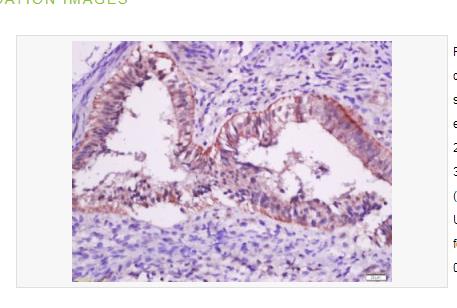Host:Rabbit
Target Protein:Mutant p53 (N235K,N239Y)
IR:Immunogen Range:230-241/393
Clonality:Polyclonal
Isotype:IgG
Entrez Gene:7157
Swiss Prot:P04637
Source:KLH conjugated synthetic peptide derived from human p53 arund the Mutation site N235K N239Y:230-241/393
Purification:affinity purified by Protein A
Storage:0.01M TBS(pH7.4) with 1% BSA, 0.03% Proclin300 and 50% Glycerol. Shipped at 4℃. Store at -20 °C for one year. Avoid repeated freeze/thaw cycles.
Background:The widely studied P53 tumor suppressor gene has been found to contain mutations in over 50% of human cancers. The level of P53 protein is low in normal cells, but is increased in response to DNA damage or various other cellular distress signals. Overexpression of the P53 transcription factor can induce ether cell cycle arrest or apoptosis through transcriptional regulation of several genes including the cell cycle ingibitor P21, DNA repair gene GADD45, and the apoptotic inducer Bax. P53 has also been shown to induce apoptosis by meas of s direct signaling pathway. P53 directly binds to and acts on several cellular protein involved in various pathway, including c-Abl, basal transcription factor TFIIH and WT1. P53 can be functionally inactivated by mutation, binding to DNA tumor virus encoded proteins, such as SV40 large T antigen, Adenovirus E1B and papilloma virus E6 proteins or as a consequence of its interaction with the oncogene-encoded protein MDM2. This antibody is recognize the Human P53 Core Domain Mutant N235KN239Y.
Size:50ul
Concentration:1mg/ml
Applications:ELISA(1:5000-10000)
IHC-P(1:100-500)
IHC-F(1:100-500)
Flow-Cyt(1μg/Test)
ICC(1:100)
IF(1:100-500)
Cross Reactive Species:Human
Mouse
.
